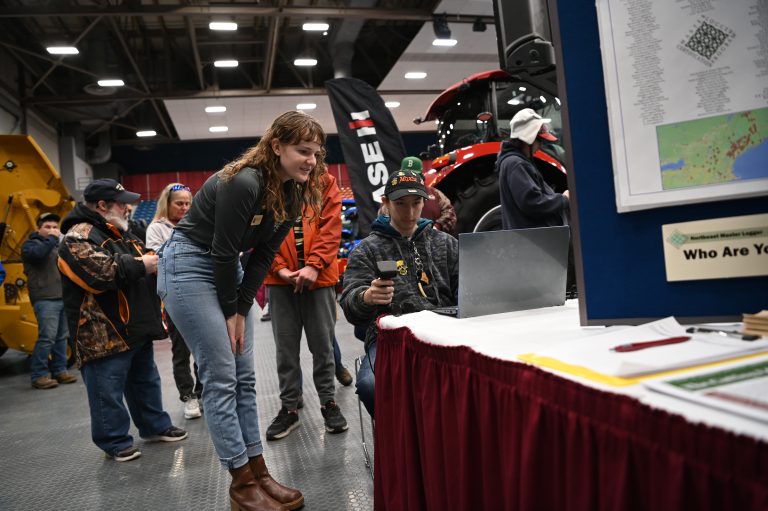First graduates complete Mechanized Logging Operations Program
MEDWAY – The first graduates of Maine’s new post-secondary training program for operators of mechanized logging equipment were recognized today at a ceremony held in the woods south of Medway where they have spent weeks harvesting timber using sophisticated state-of-the-art machines like those they will encounter in the logging industry.
The new program was launched this summer thanks to a partnership between three Maine community colleges, the Professional Logging Contractors (PLC) of Maine, and industry partners.
 On Friday, friends and family members of the students joined logging contractors, representatives of the community colleges, state lawmakers, and sponsors of the program to share a proud day with the students who completed its rigorous requirements.
On Friday, friends and family members of the students joined logging contractors, representatives of the community colleges, state lawmakers, and sponsors of the program to share a proud day with the students who completed its rigorous requirements.
“We could not be prouder today to see these newly trained forest technicians enter our industry,” Scott Madden, owner of Madden Timberlands and President of the PLC, said. “With twelve weeks of hands on training under your belt, each one of you has a great opportunity to enter this industry at just the right time. There are great things on the horizon for this industry and with the training you have received here, you will always have a job.”
While the logging industry has seen some contraction in recent years due to the loss of pulp and paper mills, the demand for skilled operators of the feller bunchers, harvesters, grapple skidders, forwarders, delimbers, and other mechanized logging equipment that now harvests more than 90 percent of all timber in Maine is strong. Many current operators are reaching retirement age and the steep costs of training new operators is driving up demand and wages.
“Logging is at a crossroads and these graduates are perfectly positioned to begin rewarding careers in an industry that – despite the headlines – is going to be around for a very long time,” PLC Executive Director Dana Doran, said. “When employers drive hundreds of miles to interview students who have not even graduated yet for jobs, it is clear there is great demand for them, and that is exactly what we have seen happen here – every one of these graduates already has a job waiting for them in the industry.”
The post-secondary program is the first of its kind in the region. It began June 19 in Millinocket, in conjunction with Eastern Maine Community College, and will rotate to other locations around the state as each class completes it.
The training gave students a broad overview of the most common mechanical systems found in modern timber harvesting equipment, and an understanding of the variables of timber growth, tree species, and markets. It also included a strong emphasis on safety.
The hands-on experience students gained operating equipment for weeks in the woods is something unavailable anywhere else in Maine and neighboring states.
The new program is working in tandem with the state’s current vocational training system and is expected to draw many of its students from within the logging industry itself as well as from Maine’s four high school vocational logging programs. For the first time, logging operators are being trained similarly to other advanced trade occupations with a high school and postsecondary approach.
Approximately 95 percent of logging in Maine now relies on mechanized equipment including feller bunchers and harvesters, delimbers, grapple skidders, and forwarders. It generally takes at least a year of training and experience before an operator becomes skilled enough to run this equipment safely and efficiently. The cost for companies to train these operators themselves is approximately $100,000 each.
It was for this reason that the PLC partnered with the Maine Community College System and industry to create the program. It was jointly developed by the PLC and Northern Maine Community College (NMCC), Eastern Maine Community College (EMCC), and Washington County Community College (WCCC) with generous support from Milton CAT/CAT Forest Products, Nortrax Inc./John Deere, and other industry partners.
The program would not have been possible without the support of Maine’s lawmakers, who made funding available for it through the ‘Put ME to Work Program’ to support creation of new job training programs at Maine’s community colleges. The program enjoyed bipartisan support, with former Maine Speaker of the House Mark W. Eves (D-North Berwick) and Senate President Michael Thibodeau (R-Winterport) speaking at the press conference where it was announced in late 2015.
Other important support for the program came from Acadia Insurance, Labonville Inc, Katahdin Fire Company, Eldon Pelletier, Steve Hanington, and Madden Timberlands Inc.
More information on the program is available online at http://www.nmcc.edu/industry-customized-training/mechanized-forest-operations/
Maine’s loggers are a vital part of the state’s forest products sector, which is worth an estimated $8.5 billion annually. Maine’s logging industry contributes $882 million to the state’s economy each year and supports more than 7,300 direct and indirect jobs in the state.
The PLC of Maine was formed in 1995 to give independent logging contractors and sole proprietors a voice in a rapidly changing forest industry. A Board of Directors made up entirely of loggers makes the PLC the only logging organization in Maine run by loggers for loggers. The mission of the PLC is to promote logging as a profession, advocate for logging professionals, cultivate responsible forest management, and sustain a strong forest products industry.
Learn more about the PLC at www.maineloggers.com.

